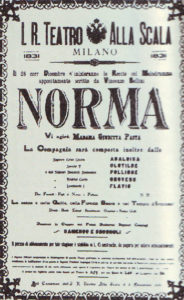Bellini, Casta Diva

The aria “Casta diva” may be one of the best examples of the bel canto style of the early 19th century. It appears in the first act of the opera Norma by Vincenzo Bellini (1801-1835).
Bel canto, or beautiful singing, generally means an elegant, florid style with long melodic lines. Bellini, even during his short life, was acknowledged as a master of bel canto style. Who else from the early 19th century wrote melodies with these same characteristics? Well, Frederic Chopin, for one, who was a friend and ardent admirer of Bellini. You might hear those similarities more readily in this performance of “Casta diva” arranged for piano, flute, and cello.
An older contemporary of Bellini and superstar of opera, Giacomo Rossini, listed three requirements for someone to become a successful bel canto singer:
a naturally beautiful voice that was even in tone throughout its full range, careful training that encouraged effortless delivery of highly florid music, and a mastery of style that could not be taught, but only assimilated from listening to the best Italian exponents.
“Casta diva” excels beyond these qualities. The level of virtuosity (vocal difficulty) was, and remains, nearly unsurpassed, and yet the singer must seem to glide effortlessly through the ultra-high vocal fireworks (coloratura). To highlight these lines, Bellini added quiet, hypnotically beautiful interjections sung by the chorus.
When Norma premiered at La Scala in 1831, it was not very well received. Even so, it had 32 performances in its first season. Within a few years it had become quite popular, and it earned the praise of diverse composers like Richard Wagner (not one inclined to hand out praise lightly) and Giuseppe Verdi.
In the opera, the Druids are resisting the invading Romans. The priestess Norma makes an appeal to the moon Goddess for peace, Casta diva (chaste Goddess).
Chaste Goddess, whose silver covers
These sacred ancient plants,
we turn to your lovely face
unclouded and without veil. . . .



